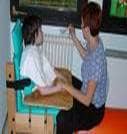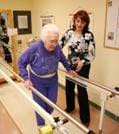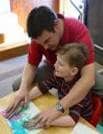INTRODUCTION
The American Heritage Dictionary defines Occupational Therapy as the "use of productive or creative activity in the treatment or rehabilitation of physically, cognitively, or emotionally disabled people". Thus an occupational therapist is a health professional that is trained in the practice of occupational therapy where his major role is to develop, improve, sustain or restore the




Occupational Therapists work with people of all ages to enable them to live meaningful lives. Occupational Therapists work in a variety of settings including schools, hospitals, communities and prisons. They are educated to have an understanding of how people do the many things that make up everyday life such as caring for themselves and others, enjoying leisure activities and working. Occupational therapists work on a one to one basis with people, developing unique interventions that may involve teaching new skills, adapting a person's environment or looking at how they could do familiar tasks in a new way.
Occupational therapists has to work on evaluating home and work environments, customized treatment programs for particular disabilities, giving recommendations for necessary adaptation, recommendation for adaptive equipments like splints, wheel chairs for temporary or permanent loss of function, assessments and records of patient progress, aids for eating and dressing required for the patients and giving guidance to the family members about the patient care. People with various problems can get benefits from occupational therapy such as work-related injuries like repetitive stress injuries to lower back problems, birth injuries, development disabilities, learning problems, mental problems like schizophrenia, Alzheimer's and post-traumatic stress, vision or cognitive problems etc.
Occupational therapists are in high demand all over the country and world especially in the conventional medical and fitness arenas. Job opportunities in occupational therapy are available in various sectors.
• In the field of medical specialties they can get employed in hospitals, polyclinics, rehabilitation centers, psychiatric institutions, community mental health centers.
• Ergonomic consultations: They may also work with individuals who are dealing with alcoholism, drug abuse, depression, eating disorders, or stress related disorders.
• In schools, the occupational therapists evaluate the abilities of children and recommend the therapy.
• Residential care facilities.
• Adult daycare programs where they can help the senior citizens to lead more active, independent and productive lives.
• Special schools.
• Sports teams etc.
William Rush Dunton, Jr., M.D. was a vigorous and active psychiatrist. During his productive career, he published books, papers, and was a founding member of three professional societies. He spent his professional life in Baltimore, and died in December 1966, at the age of ninety-eight.
Born in Philadelphia in 1868, Dunton was the nephew of Benjamin Rush, M.D., father of American Psychiatry. After receiving undergraduate and master's level training at Haverford College, Dunton graduated from medical school at the University of Pennsylvania in 1893. As a young physician he then came to Johns Hopkins, were he learned the method of asepsis. He became acquainted there with Dr. Henry Mills Hurd, the Hopkins' first superintendent. Dr. Hurd encouraged Dunton to write his first medical paper. After leaving Hopkins, he became assistant physician at the Sheppard Asylum, forerunner of today's Sheppard and Enoch Pratt Hospital. Early in his work with the mentally ill, he became intrigued by the healing potential of occupational activities for patients. His treatment recommendations included emphasis upon busy, productive activities in patients' daily schedules. One of his early articles, from Public Health Nurse (1918), was entitled "The Principles of Occupational Therapy." In 1919, he wrote that all patients "should have occupations which they enjoy...., that sick minds, sick bodies, [and] sick souls may be healed through occupation." In 1928 he wrote, "... occupation is as necessary as food and drink."
He helped to form a society of occupational therapists, which in 1917 became the National Society for the Promotion of Occupational Therapy. This group is now called the American Occupational Therapy Association. He was the author of two respected textbooks on Occupational Therapy. The first of these books, Reconstruction Therapy, published in 1919 by W.B. Saunders, Co., was regarded in its day as a classic reference book. The other textbook was Prescribing Occupational Therapy, published in 1928 by Charles C. Thomas, Co. Today, almost thirty years after his death, his contributions are still cited in the field. The eight editions (1993) of Willard and Spackman's Occupational Therapy, edited by Hopkins and Smith, cites thirteen of Dunton's articles, published between 1918 and 1946. This present-day major textbook regards Dunton as having "added specificity to core concepts of occupational therapy by analyzing activities in terms of their creativity, physical effort, social potential, and intellectual demands, and matching them with the categorized needs of patients." One of Dunton's articles cited in this text is from the Archives of Occupational Therapy (1923), and is intriguingly entitled, "Debate Upon Toy-Making as a Therapeutic Occupation."
He was among the founding group of the Maryland Psychiatric Society, and served as its first secretary, beginning with the inaugural meeting of the Society which was held at Sheppard Pratt on November 6, 1908. He was a charter member of the Baltimore County Medical Association which was begun in 1896. He edited the Maryland Psychiatric Quarterly and wrote one of its regular columns, called "Occupations and Amusements," in which he talked about his occupational therapy ideas. He also assisted in editing the American Journal of Psychiatry for many years. In 1922, he became editor of the Archives of Occupational Therapy, today known as Occupational Therapy and Rehabilitation. Throughout Dunton's life occupational therapy was one of his major interests. He encouraged his patients to pursue quilt-making, and he became an avid quilt maker himself. In his obituary, published in the December 23, 1966, Baltimore Sun, he was said to have taken up quilt-making in 1915. He felt that the bright colors were pleasing to patients, and that the cutting and sewing helped to take their minds off their inner problems. Dr. Dunton's passion for quilts was such that he organized three shows at the Baltimore Museum of Art. He made photographs of hundreds of quilts, and also wrote a book about them. A man of great energy and many interests, he was also the drummer in the doctors' orchestra of the Maryland Medical and Chirurgical Faculty.
Probably Mr. Kidner's outstanding accomplishment was in connection with the fight against tuberculosis, particularly as the disease affected the returned soldiers. He developed a system of occupational therapeutics on very wide lines, the results of which were most gratifying. The education of the returned men was promoted and their morale elevated in a most wonderful way. Apart from the benefits accruing to the men themselves, the good effects of the system were manifested in the facts that absenteeism was reduced 30 per cent, immoral conduct became almost unknown, and the conduct of the men was so improved that it became possible to dispense with police protection. All this became possible because of Mr. Kidner's wise foresight, breadth of view, and powers of organization, but perhaps, most of all as a result of his natural kindliness of disposition and the tact that he exercised wherever he was brought into contact with those in and under authority.
In 1917 Mr. Kidner was loaned by Canada to be special adviser on rehabilitation to the newly organized United States Federal Board for Vocational Education in Washington, D.C. In 1919 he was appointed to the Staff of the National Tuberculosis Association as Institutional Secretary, a. position which he held until 1926. He then resigned to become a consultant on hospital, sanatorium, and institutional planning, and on rehabilitation projects.
Mr. Kidner had a bright mind, was enthusiastic and kindly, and his association with the medical profession was always helpful both to the man in authority and to the disabled soldier. He will long be missed as an expert in an important line of work and deserves all the honour that we can pay him.
Horoscope - Career for Zodiac Signs
So if you are ready to take up your career in this field just check out if your sun sign is in the list below which would best suit occupational therapy.
 Taurus
Taurus
 Cancer
Cancer
 Leo
Leo
 Virgo
Virgo
 Libra
Libra
 Scorpio
Scorpio
 Capricorn
Capricorn
 Aquarius
Aquarius
 Pisces
Pisces
Eligibility : Click here for more information
Institutes : Some of the prominent institutions offering courses in Occupational Therapy can be had from the following links.. Click here for more information